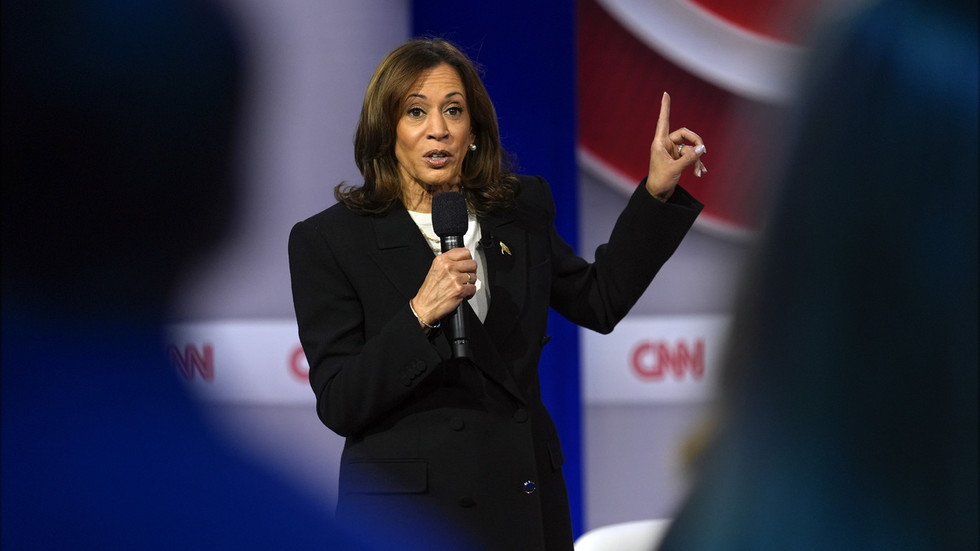In a recent CNN town hall, Vice President Kamala Harris faced scrutiny over her ability to articulate a clear vision for her presidency as the U.S. election day approaches. Despite the critical nature of the forum, she frequently evaded straightforward questions and instead resorted to attacking her rival, Donald Trump. Following a contentious primary nominated by the Democratic party, which involved pressure on President Joe Biden to step aside, Harris is attempting to position herself as a transformative leader. However, President Biden’s acknowledgment of her integral role within his administration complicates her narrative of being an agent of change. In a perplexing exchange with Anderson Cooper, Harris responded to inquiries about her policy developments since 2021 with vague references to more work needing to be done, leading a former Trump campaign aide to label her responses as “word salad.”
Throughout the town hall, Harris struggled with even basic questions, including a softly framed inquiry related to her past controversial positions. Despite Cooper’s attempts to guide her into a simple affirmation, she digressed into complex explanations about her strategies, indicating a lack of concise messaging. The town hall was marked by moments of tension, particularly when Cooper pointedly reminded her of her past statements regarding the border wall. Instead of addressing her previous calls to end the wall as a “stupid, useless, and medieval vanity project,” Harris deflected to criticizing Trump’s approach to the fence, demonstrating a reluctance to clarify her own stance and actions. This focus on naming her opponent rather than detailing her policies attracted further criticism, with pundits noting that a mere anti-Trump message would be insufficient for winning elections.
Media analysts and pundits, including CNN’s Jake Tapper and Dana Bash, indicated that Harris’s performance failed to reassure voters about her intentions and priorities. They suggested that, while some may have gained a better understanding of Harris as a person, her policy positions remained ambiguous. Tapping into her past as a prosecutor, she attempted to relate her experiences to questions on various subjects, from immigration issues to inflation. However, this approach did little to clarify her legislative priorities, with Bash highlighting the absence of concrete examples in her responses. The overall impression conveyed was that Harris’s performance fell short of decisively closing the deal with voters.
One of the recurring themes in Harris’s responses was a general sense of dissatisfaction with existing policies while failing to provide a roadmap for how she envisioned improvements. This strategic choice to highlight grievances without offering specifics left many observers questioning her actual plans and priorities should she ascend to the presidency. Harris proposed implementing measures such as price controls, Supreme Court reforms, and tax equity for wealthy individuals, yet she did not elucidate how these initiatives would be executed or their potential impacts on American society. Such omissions might raise doubts about her readiness to govern effectively.
Furthermore, as the Democratic party has undergone significant shifts in its nominations and endorsements, Harris’s journey has been marked by internal party dynamics and clashes with Biden’s administration. Her messaging must navigate this complex landscape, where she must simultaneously uphold the current administration’s policies while also trying to carve out a distinct identity as a contender for the presidency. This duplicity raises questions about her ability to resonate with both her party’s base and undecided voters, essential components in a successful campaign. Harris’s reliance on familiar themes from her prosecutorial background might not be enough to inspire confidence that she could tackle the myriad challenges facing the country.
As the election nears, the implications of Harris’s performance during the town hall and her communication strategies become increasingly significant. Candidates are often judged not only by their political views but also by their ability to articulate those views persuasively and engage with skepticism. The Republican response to Harris’s town hall indicates a keen awareness of her vulnerabilities and a strategy to exploit them in the upcoming campaign. As she continues to navigate her presidential ambitions, the pressure to refine her message and clarify her policy proposals intensifies, underscoring the importance of effective political communication in determining electoral outcomes.

